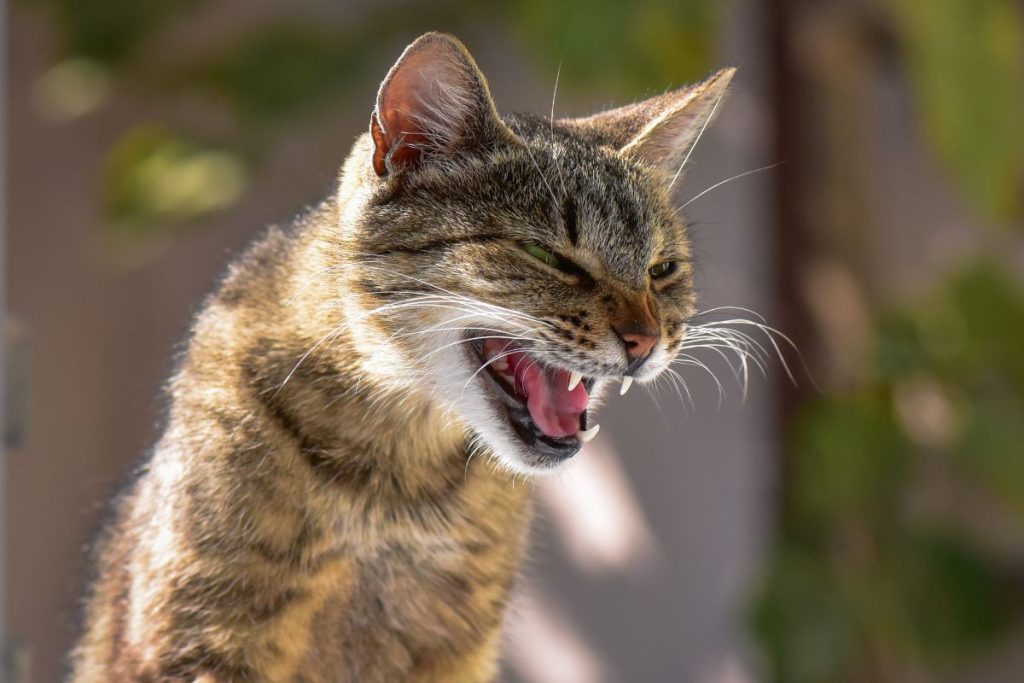Panting in Cats
You may be wondering how to calm a panting cat. Although some panting in cats is natural, it can also indicate a serious issue that requires immediate veterinary attention.
If you see your cat panting like a dog and struggling to breathe, evaluate the scenario using the criteria outlined below. Bring your cat to the vet if the heavy breathing is unusual or persists for an extended time.
Why Do Cats Pant?
A cat’s pants may be normal in some instances. The question is. “what was your cat doing or experiencing right before you observed your panting cat? Cats, like dogs, may pant when anxious, stressed, or hot. Another possible cause is a strenuous activity. These types of panting should stop when your cat has had an opportunity to relax, calm down, and cool down.
Even so, this panting form is much less common among cats than dogs. So, if you’re unsure why your cat is panting like a dog, it’s advisable to take them to the veterinarian.
How Does Cat Panting Look and How Does it Sound?
Cats with breathing problems can resemble panting in dogs, although it is far less prevalent. Your cat would be breathing in and out with their mouth open and tongue partly out. Your cat will most likely be resting flat during it, but if they are disturbed about their surroundings, they may try to stand up and be vigilant.
How to Calm a Panting Cat
The first step is determining why your cat is breathing heavily. Is your cat extremely hot? Have you gone exploring when the sun is shining? Maybe your cat was running along a hiking trail. They would be exhausted from using so much energy. Or you and your cat may be in the car, and your cat is not fond of the car. They could be panting as a result of stress.
Is Your Cat Panting From Heat?
Cats who explore tend to pant because they’ve been having so much fun exploring their world that the temperatures have risen, “and they’re overheating.” It’s time to cool them down if they have gotten to this state and you believe your cat is breathing weirdly. Here’s what you can do to help your fur baby cool down.
Change to a cooler or shaded area: Move to a shaded place or into an air-conditioned room. Cool your cat down using water: To cool down, your cat should drink some water. Cats, on the other hand, are famously poor at drinking water. Keeping this in mind, you need to be a little more inventive in using water to cool them down.Soak a cloth (or a tissue) in water and place it over your cat’s ears, neck, and paws.Wet their forehead slightly.Wet your cat’s lips to encourage them to drink water.Wet their cat snood or bandana if they wear one. Another great way to stop your “cat from panting like a dog.” is to get them a cooling vest, an ice pack, or a pet cooling pack that you can fit in your backpack.
Is Your Cat Panting Due to Overexertion?
Well, why do cats pant? Most cats will begin panting after pursuing their favorite toy. They have so much fun bouncing and running that they forget to rest. This can also happen to your cat while taking them on a walk. They’re having such a good time that they don’t notice how exhausted they are.
Is Your Cat Panting Because of Stress?
We should treat all sorts of panting. However, if your cat displays signs of stress when exploring, you should relieve that stress as quickly as possible.
Stay calm: We’ve all been in situations where our cat has displayed signals of distress. Then we begin to worry and become concerned. Our pulse rate increases, and before we realize it, our cats sense our anxiety. It’s simpler said than done. When your cat begins panting or showing signs of stress, remain calm.Determine what is bothering your cat and remove them from the situation.Soothe your cat: Reassure your cat that everything is fine. That you will not stress them out and that they are safe.Take your cat home: If stress panting occurs while exploring, it might be time to return home. It would be helpful to move your cat into a comfy, safe space, they know.
Breathing issues can affect cats of any breed or maturity, and they can swiftly become fatal. If your cat has difficulty breathing, you should bring them to the veterinarian as soon as possible. The nostrils, throat (pharynx and larynx), esophagus, and lungs are all elements of a cat’s respiratory system.
Cats with breathing problems can result from diseases in any element of this system or the respiratory center in the brain. Cats are excellent at concealing disease symptoms, making it difficult to evaluate if your fur baby is breathing correctly. A typical cat takes 20 to 30 breaths per minute, and their breathing should never be labored or difficult.
Why is Your Cat Struggling to Breathe?
Difficulty or labored breathing in cats, commonly known as dyspnea, can indicate various problems, including illness, trauma, or bleeding. Other causes of a cat’s difficulty breathing include foreign items, heart failure, asthma, and anemia. Allergies, discomfort, fever, and medicine are all possibilities as well.
Why is Your Cat Breathing Fast?
Heavy breathing in cats, commonly known as tachypnea, may indicate low blood oxygen levels (hypoxemia), low red blood cell levels (anemia), or asthma. A cat breathing quickly could be caused by fluid in the lungs due to heart problems or fluid in the diaphragm around the lungs. A heavy-breathing cat can result from blood going into the lungs or tumors.
Should You See a Vet When Your Feline is Panting?
If you’ve examined your cat’s activity and temperature and they are not exhausted from exercise, anxious, or overheated, their heavy or laborious breathing could signify a significant medical problem. In this case, immediate veterinary attention is essential. You may be able to minimize healing time or possibly save a life with early intervention.
Panting or Heavy Breathing Symptoms:
Cat owners should be mindful of several frequent indications of labored breathing or panting. Here is a handful of the most common:
Wheezing and coughing (in some cases)Appetite lossHiding away LethargyGums with a purplish or bluish colorBreathing that is labored (this can include quick, loud, or shallow breathing)Extending the neck or head and pushing the arms away from the body when crouching or standing
A Panting Cat’s Treatment
Make a note of any of the symptoms your cat is having and report them to your veterinarian as soon as you discover them so they can begin diagnosing. Knowing these signs can assist your veterinarian in determining which tests are required to identify the underlying problem. Here are some solutions that your veterinarian may recommend:
A treatment strategy for a frightened catHeartworm treatmentInhalers for asthmaAntibiotics to treat infections.Surgery to address heart problems
Treatments might vary greatly depending on the source of your cat’s heavy breathing. It might be as easy as modifying your cat’s or kitten’s care to help them recover from their trauma or as difficult and dangerous as emergency surgery. Always talk with your vet and give them as much detail as possible to provide the best care for your cat.
Preventing Cat Panting
Cats do, technically, pant. Cats, on the other hand, do not pant after playing, unlike dogs, who aggressively pant to cool themselves after activity. When panting occurs, it is usually extremely closely related to severe exercise and lasts for a very brief time, and then resolves relatively fast.
Whereas any cat may physically pant, particular types of cats are much more prone to panting due to their respiratory structure or their fur coat. Himalayans and Persians, which have flat faces and narrower nostrils, and Maine Coons and other long-haired cat varieties are examples of cat breeds that may be prone to panting or heavy breathing.
Depending on your cat, it may not be possible to completely prevent your cat from having an open mouth and panting. However, there are some precautions you can take. For example, you can avoid keeping your cat in overly warm conditions, keep its personal space calm and safe and avoid allowing it to do intense or vigorous exercise
What Does Normal Panting in Cats Look Like?
A cat’s physiology is extremely efficient, and they hardly ever breathe via their lips. When we notice a cat panting, we know something is wrong. The goal is to evaluate the whole environment around the panting incident to determine if it is due to a “normal” cause of panting or maybe an “abnormal” reason caused by an unresolved medical problem.
Typical causes of cat panting include
Recent excessive or heavy playA new stressor, such as home construction or an unexpected houseguest or petTravel-related anxietyOverheating
However, if you notice your cat pant in any of these conditions, you should assist and enable your cat to relax, rest, or cool off.
Should your cat not calm down and persists to pant, you should take them to the veterinarian immediately. The most essential thing you can do to help your stressed-out cat in the vehicle would be to keep them as calm as possible and attempt to lessen its agitation.
The best approach to keeping your cat happy and secure is to plan ahead. Before vehicle travel, some cats benefit from a pheromone spray, a natural soothing treat, or prescribed calming medicine.
Examine the sides of the cat’s tummy to discover how quickly they pump air towards their lungs. This is a symptom of respiratory distress if they are lying flat, not wanting to move much, and pushing the air by contracting their stomach muscles both in and out at a pace of more than over 40 breaths each minute.
What Constitutes a Cat Panting Emergency?
In contrast to normal panting, excessive panting in cats usually begins randomly or without cause. It also does not improve quickly with resting or eliminating the source of stress or heat. It frequently accompanies other aberrant behaviors such as coughing, drowsiness, and a greater struggle to breathe.
We can detect unusual panting in cats of any age, although kittens and older cats are frequently afflicted. Many medical disorders can induce abnormal cat panting, including
TraumaAnemia ( which means a low red blood cell count)Heart failure with congestive edemaHeartworm infectionAsthmaRespiratory illness
Sadly, respiratory illness is one of the most likely causes encountered by cats in the emergency room. Abnormal panting and other concerning habits are frequently seen with an underlying ailment. If you feel your cat may have an underlying disease, you should get your fur baby to the vet as soon as possible.
A Final Word
Cats do occasionally pant based on the situation; however, it is not typical. Most typically, one may observe a cat or kitten pant whenever they are stressed, sweaty, or exhausted from physical activity. Panting is a natural response in these situations and should lessen once they have had a chance to calm down or relax.
Panting in Cats You may be wondering how to calm a panting cat. Although some panting in cats is natural, … Read more >

